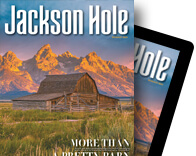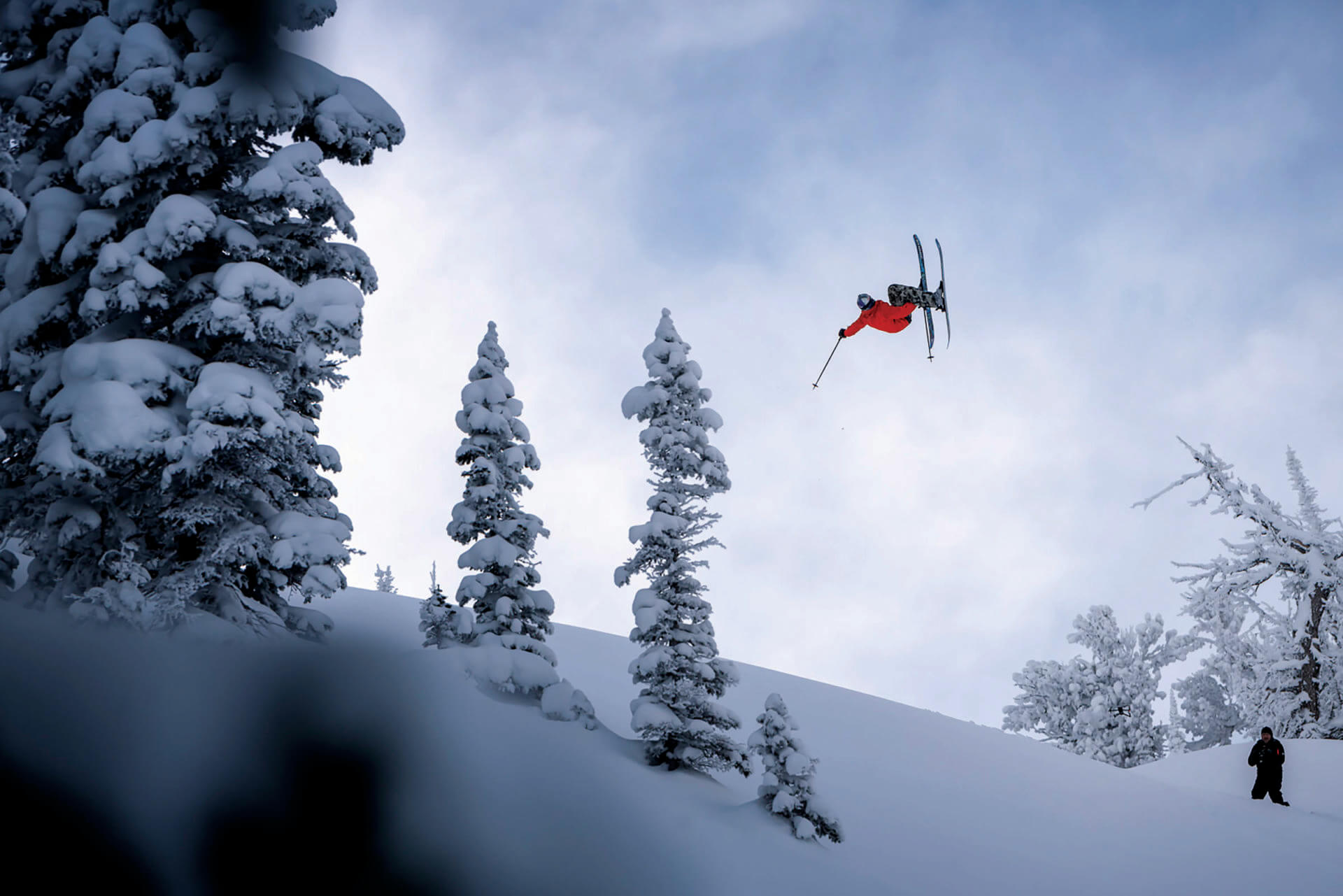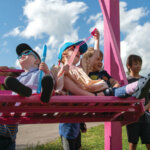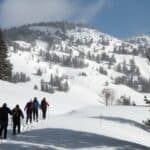Read The
Current Issue
Little Rippers
Kids that grow up skiing Jackson Hole are a different breed of mountain athlete.
// by Dina Mishev and Brigid Mander
grom [ghrom]: noun, plural: groms
Shortened from the word grommet, a grom is a young kid who is a badass skier or snowboarder. Groms are usually super chill and positive and like to encourage their friends. Grom can be used for any gender.
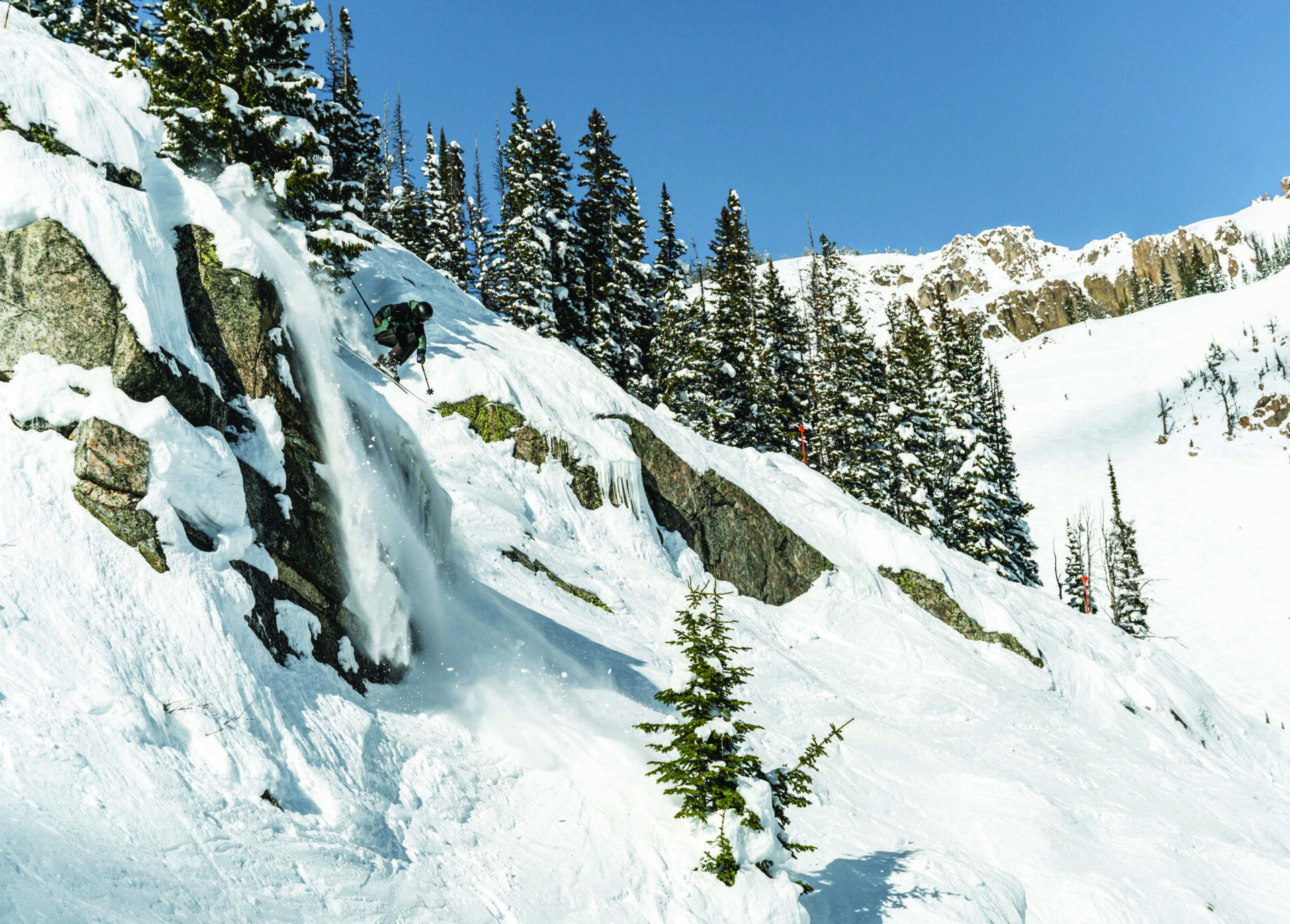
When he was five years old, Nate Pruzan, now 16, and his friend Matty Wilson skipped out on one of their regular group lessons at Jackson Hole Mountain Resort’s Kids Ranch. They didn’t ditch to play video games or build a snow fort, but to ski tram laps. The duo made it as far as the tram dock—carrying their ski gear and successfully navigating the maze of the tram line, which both had done previously with their parents—before their plan was foiled by a sharp-eyed ski patroller who noticed the two unaccompanied preschoolers and had them returned to Kids Ranch. It’s not surprising then, that, later that winter, Nate asked his dad, Aaron Pruzan, who, along with his wife, Tamsen, is an expert skier, if he could ski Corbet’s Couloir, a line at JHMR that is vertical at the start and only gets slightly less steep once you’ve dropped in. With a couple of years of lessons and countless ski days with mom, dad, and his older brother already under his boots, Nate seemed ready. Dad skied into Corbet’s first. Nate followed and skied it better than most adults.
Four years later, when Nate was nine, Jackson Hole Mountain Resort made a short film about him and his dad: Corbet’s Couloir—Father and Son. When Nate was five, his dad was the stronger skier, but by the time this movie was made, father and son skied at the same speed. “Or maybe he [was] a little faster,” Aaron says. “He certainly wanted to jump off more things than I did. [Seeing my son surpass me] was fun. I knew it was going to happen. I just didn’t know that it was going to be so fast. Kids that grow up skiing in Jackson, they have this amazing mountain, which is this massive terrain park, to ski and experience, and it’s nice having all of those opportunities and being such a complete skier.”
Five years ago, when Matt Newton arrived in the valley from Utah to work with the Jackson Hole Ski & Snowboard Club’s freeride program, he noticed that Jackson kids were a different breed. (Freeriding is a discipline in which skiers and snowboarders are judged on their control, fluidity, technique, and style/energy. If you’ve watched a modern ski movie, most of the skiing and riding featured in it would likely be classified as freeriding.) “These kids have spent their whole lives skiing here and have only known big terrain. I noticed right away they had a lot of comfort with exposure and were really confident and at ease in big mountains and going fast,” says Newton, who is now the JHSC’s head freeride coach. Nate Pruzan would agree. He says his skiing is “normal. I don’t feel like I’m pushing it.”
Jess McMillan is now a mom herself to three-year-old Lincoln. She’s not racing to be a ski parent though. As of last October, he had not yet been on alpine skis. “Right now, we go Nordic skiing and I pull him,” she says. “We’re in no rush to get him on skis. I want it to be fun
or him. I didn’t start skiing until I was five.”
Even though Nate doesn’t feel like he’s pushing it, his mom, Tamsen, recognizes that he, and many kids in Jackson, are pushing it. “As parents, you definitely question your parenting,” she says. “As an adult, you have a far better understanding of the risks and negative outcomes. But then you have this kid who wants to push themself and they’ve spent years doing lessons and training and skill development. What do you do?” (This question and the answers Jackson Hole parents have to it is a feature story of its own that you might see in a future issue of Jackson Hole magazine. This article sticks to the amazing skiing done by some local kids.)
Sixteen-year-old skier Lucy Wirth moved to Jackson Hole from Boise, Idaho in 2019 with her family—parents Adam and Kellie Wirth, and older brother, Mac, now 18. “When we first got here, I noticed much more intensity in the skiers here, but it was still so fun,” she says. “Everyone was so good, and we just ripped around.”
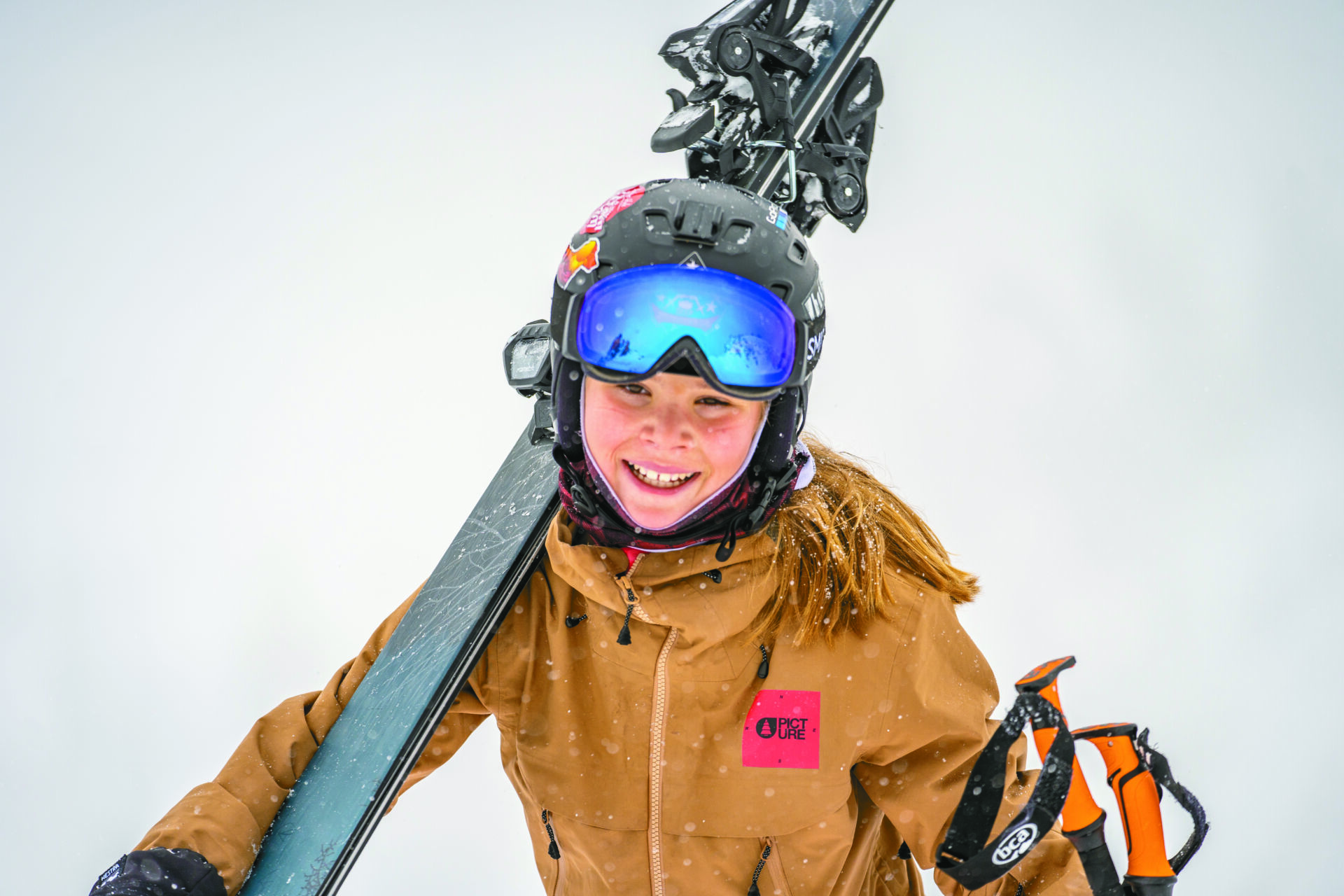
Last year, Caroline Brokaw, a 13-year-old freerider with JHMR’s Evolution Team, won a footage competition for kids sponsored by Jackson Hole-based Teton Gravity Research, one of the ski and snowboard industry’s biggest media powerhouses. Because of this, footage of her sending a cliff appeared in the opener of TGR’s 2023 movie Legend Has It. In addition to her TGR debut, Brokaw’s skiing is in this winter’s movie Advice for Girls.
The Gentry brothers—Luke, 20, and Wyatt, 16—started skiing JHMR when they were toddlers. They went to daycare at JHMR Kids Ranch every day and did weekend ski lessons at the resort. “Skiing has always been a huge focus for my family and part of our lives, it is just what we do,” Luke says. “We did play other sports, but skiing was what we wanted to do all the time. And skiing here in particular is a fast track to an incredibly high level.” Last year, Wyatt, who, like Brokaw is on JHMR’s Evolution Team, placed third at the Junior Freeride World Championships in Kappl, Austria. He skied a line that “no other riders were looking at as skiable,” his coach Simon Lynes told Buckrail. Lynes says skiing in Jackson prepared Gentry for the championship’s terrain “in a way almost no other mountain could.” Luke says, “So many kids here have the same mindset; everyone is just very good.”
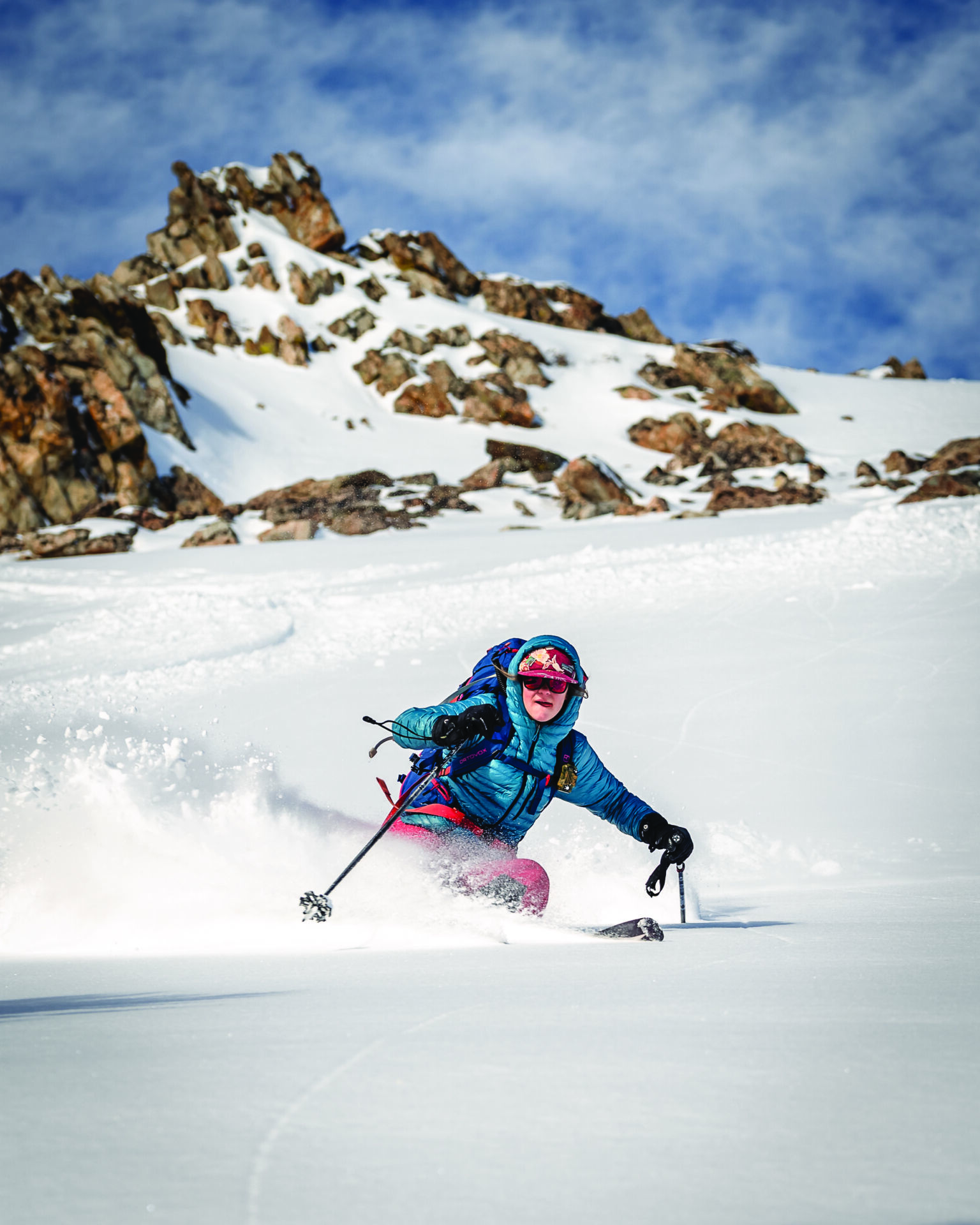
“It’s so awesome having my dad as a mentor. He’s a great teacher, he shows us things and talks about safety as we go, and I have learned things about the mountains I know I’ll use for the rest of my life.”
—Lucy Wirth
Mountains are so embedded in the Jackson Hole community and lifestyle that skiing parents are not needed for a kid to become a ripper. Born and raised in Jackson to non-skiing parents, Jess McMillan was the 2007 Freeskiing World Tour Champion and 2007 U.S. Freeskiing Champion and has been featured in more Warren Miller Entertainment films than she can count, including 2014’s No Turning Back, during the filming of which she and Ingrid Backstrom notched several first-female descents of huge lines in Alaska. “I am straight up a product of the community and environment,” says McMillan, who today is director of events and partnerships at Jackson Hole Mountain Resort. “Recreation and getting into the mountains were part of daily life,” she says. Most days after school in the winter, she and her friends, who were part of the JHSC, skied at Snow King. “We had the run of the place. We’d squeeze three of us onto the old double chair—because you can do that when you’re that little—eat Airhead candies, and just rule the King. We felt like we owned it.”
McMillan first skied when she was in kindergarten. “The Wilson School had a winter-sports program every Friday,” she says. “You could choose different sports, and I chose alpine skiing. As soon as my mom saw how much I loved it, she got me into lessons and out skiing with family friends.” She started racing with the JHSC around the time she was eight years old and did that until college.
While some would argue whether or not raising ripping skiers and riders is a worthy goal, kid skiers learn lessons on the slopes that inform and translate to other parts of their lives. JHSC executive director Ali Sehnert says, “Our goal is to make great athletes and great human beings.” McMillan, a JHSC alumna, says, “In skiing, we were allowed to wreck and fail, to get lost, and have a sense of adventure and respect for the environment.” Brokaw finds motivation and self-confidence in skiing. “I see all my teammates doing all this cool stuff, and I feel it is possible for me too,” she says. “Right now, I feel I have the greatest ski group [EVO]; they are all I could wish for. They are all doing well in competition, so even though I am the youngest in my group, it motivates me more.”
Wirth isn’t just a resort skier. Her parents introduced her to backcountry skiing, skiing done in areas inaccessible by ski lifts—you have to climb up before skiing down—and where there is no ski patrol that does avalanche mitigation, at a young age. By the time she was in second grade, she skied Wimpy’s, a noteworthy backcountry run in Grand Teton National Park with her parents and older brother. “It was so rewarding, as a little kid in the park we just got to go out with our parents and have a great time as a family,” she says. “It’s so awesome having my dad as a mentor. He’s a great teacher, he shows us things and talks about safety as we go, and I have learned things about the mountains I know I’ll use for the rest of my life.”
Nate’s mom, Tamsen, says being able to be in the mountains as a family—Nate has an older brother and a younger sister, both of whom are also mountain athletes—is special. “It takes so much time and energy to build these mountain kids, when you finally do get to go out with them, it makes for really lasting memories.” Tamsen grew up in Jackson running in the mountains with her mom. “It was something we could always come back to,” she says. “Getting into the mountains was ground zero no matter what had happened, and now the mountains are ground zero for my family. We get into the mountains, and that is where we can communicate and enjoy each other. I hope this story inspires parents to take their kids into the mountains at whatever level they can.”
Skiing might have helped Luke Gentry find a career. In 2022, he, Wyatt, and their friend Tucker Carr, all members of the Salomon Junior Mountain Collective Team, released the 15-minute movie A Little Rogue, A Little Rowdy. Hailed as a “Gen Z magnum opus” by the website Gear Junkie, the film, which follows the trio on a trip around the West as they meet up and ski with other Salomon junior athletes, was nominated for an award at the International Freesports Film Festival. This winter, Luke is taking a gap year to hone his cinematography skills with Teton Gravity Research before he leaves to study film and computer engineering at Montana State University.
Two local nonprofits use skiing and riding to help with mental health and also to bridge Jackson Hole’s economic gap. Between 2017 and 2021, Wyoming had the highest suicide rate in the country. In 2022, the state’s suicide rate dropped 22 percent (to 26.66 suicides per 100,000 residents), which put it behind Montana and Alaska, but the suicide rate in Teton County did not change. Perhaps contributing to this, and also a problem on its own, Teton County, Wyoming, is the most economically unequal place in the United Statesaccording to the Economic Policy Institute; in 2021 the average annual income among the county’s top 1 percent was $22.5 million while the median household income was about $94,000.
Jackson Hole native and former pro snowboarder Adam Dowell founded the nonprofit Carving the Future in 2018 with the idea of using snow- and skateboarding to “alleviate the mental health crisis in Wyoming.” Snowboarding was Dowell’s release when his brother, Levi, and his mom, Terrie, died within two years of each other. Dowell was 16 when Levi died. When his mom died so soon after, he struggled to cope with his grief and had severe anxiety and depression. He told Jackson Hole Snowboarder magazine, “I really had nothing else going for me other than snowboarding.”
In 2012, Emily Coombs founded the Doug Coombs Foundation in honor of her late husband, ski legend Doug Coombs. Her goal was to remove economic and cultural barriers so children from various backgrounds in the Jackson community could experience the joy of skiing, develop a lifelong passion, and feel a part of and welcomed in the area’s snow-sports community. Coombs ran the organization herself for seven years; during this time more than 200 kids learned to ski (so did some of their parents).
“Skiing taught me so many life skills,” McMillan says. “I learned to work hard and that life isn’t fair. I learned that it’s okay to fail and that you are going to fail and that, when this happens, you have to keep trying. I learned dedication and, even though this sounds dark, I learned how to suffer. And I learned a skill that I will have for the rest of my life that I enjoy. Skiing is a cool gift parents, or a community, can give kids.”
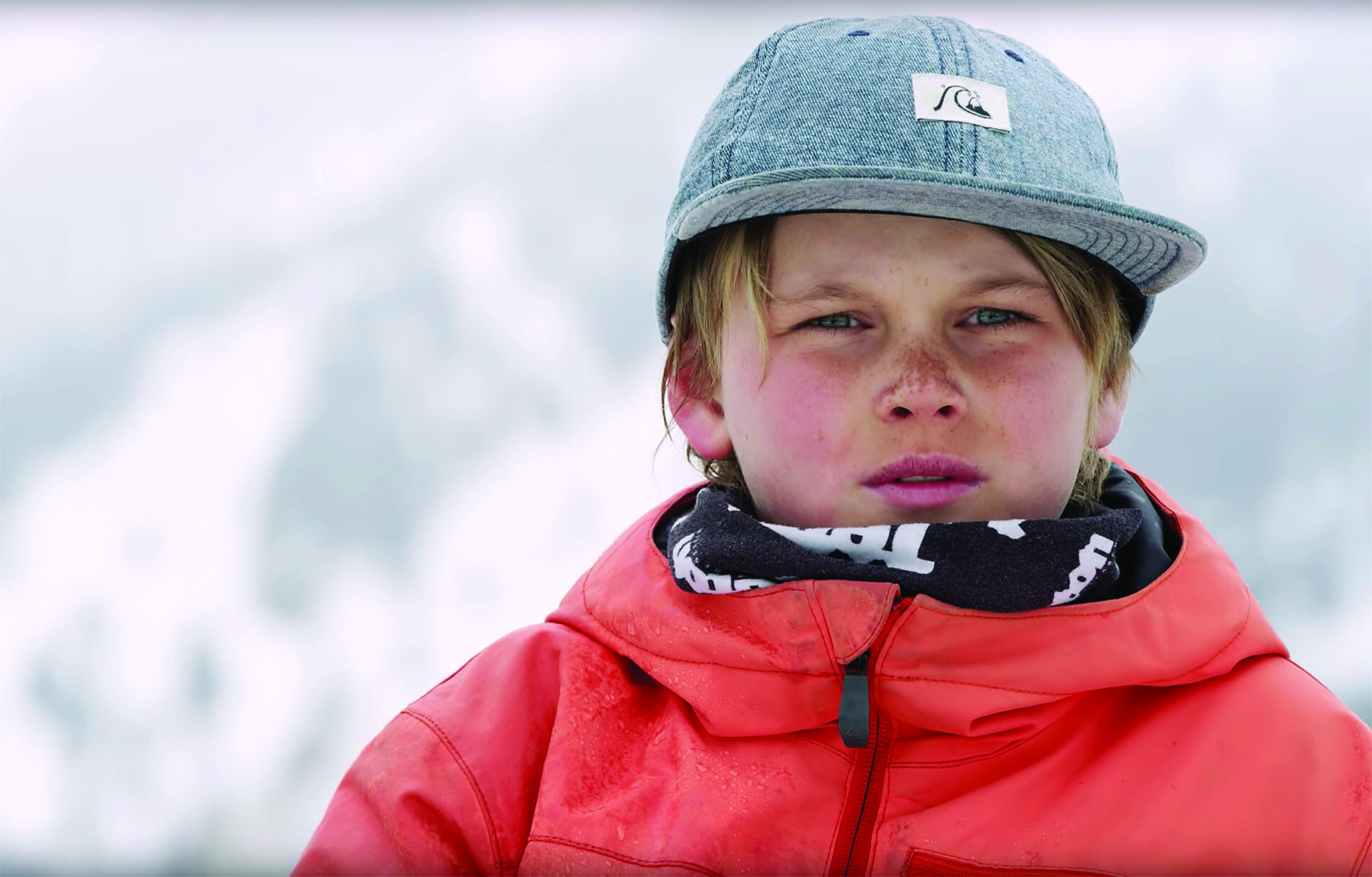
The Most Famous Grom of All: Kai Jones
At 17 years old, Kai Jones has already appeared in five ski movies. His first was Teton Gravity Research’s Far Out. In it, an 11-year-old Kai skis off a snaggly 35-foot cliff in the Jackson Hole backcountry. (This clip now has more than six million views on YouTube.) That same year, Kai won the under-12 overall title on the International Freeskier Association’s big-mountain competition circuit. At 14, he was the subject of a feature profile in The New York Times. During these early years of his ski career, there was talk that Kai only had what he had because his dad was Todd Jones, one of TGR’s founders. That certainly helped, but Kai now stands on his own two skis, stomping the same lines as professional skiers 10 years his senior.
Today, on the slopes and in the base areas of Jackson Hole or Grand Targhee, where he started skiing when he was 18 months old, kids and adults stop Kai, asking him to pose for selfies or sign their ski helmets. More than 123,000 people follow his adventures—he’s also a mountain biker—on Instagram. “I like Kai Jones because he’s a young skier like me and he goes massive,” says 10-year-old Eli Davenport, who lives in Basalt, Colorado, and skied Jackson Hole last winter for the first time. “I like his style as a skier and I like to watch videos of him sending it. There’s not a lot of other kids who go huge like him.” @kaijonesski
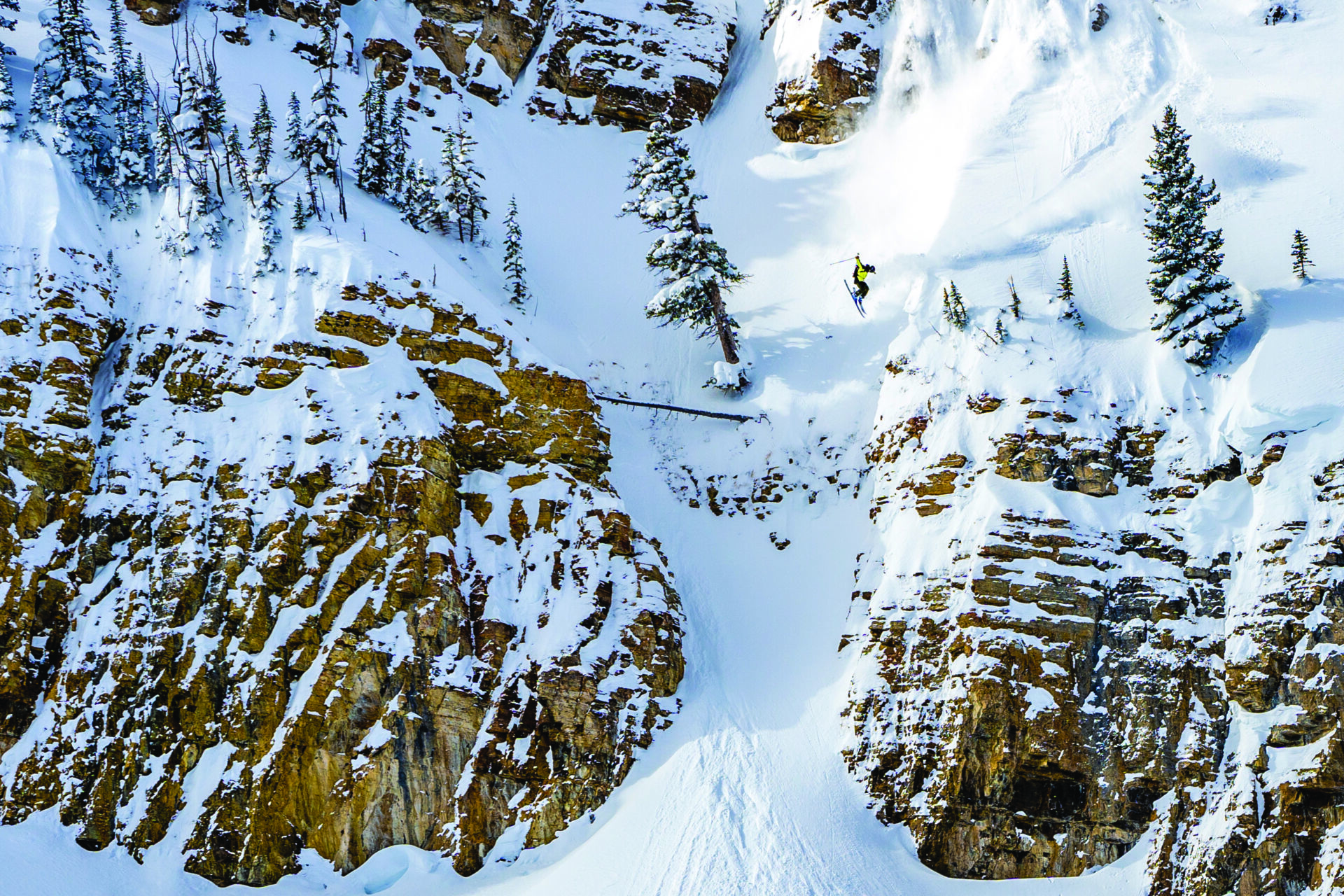
Jackson Hole Ski & Snowboard Club
The Jackson Hole Ski and Snowboard Club is the valley’s oldest nonprofit. Founded in 1938, the year before Snow King opened as Wyoming’s first ski area, it provides training and competition opportunities for about 500 student athletes in five different disciplines (alpine and Nordic racing, freeskiing, backcountry skiing, and snowboarding). JHSC alum—Breezy Johnson, Resi Steigler, Pete Karns, and Travis Rice, to name just a few—have gone on to compete for the U.S. Ski Team, land on podiums, and be featured in ski movies. Athletes must maintain a minimum GPA to participate.
As successful as its athletes have been, among the most valuable lessons the club and its coaches teach kids are the importance of a healthy community, good sportsmanship, setting and pursuing goals, competition, and, at the end of the day, that skiing is supposed to be fun. The ski club wants skiing and these lessons to be accessible for all kids and understands that cost can be a barrier. According to Ali Sehnert, the JHSC’s executive director, currently, about $130,000 is available annually for scholarships. About $120,000 of this goes to need-based applicants, and about 20 percent of JHSC athletes receive some funding. “This covers any kid, from a beginner to one that’s been with us for 12 years, and the fund is anonymous,” says Sehnert. “I’d love to see even more kids apply—if we outgrow our funds, then we will raise our funding goals.” JH
